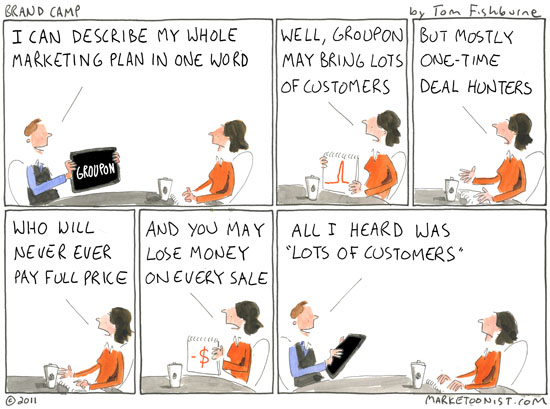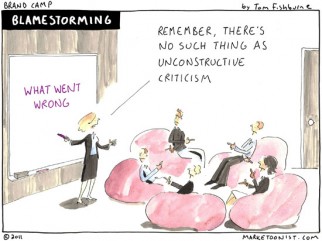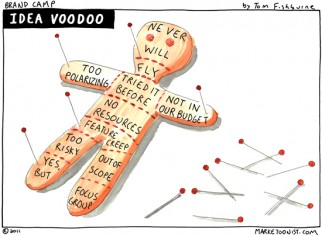Many marketers asked Santa for a social coupon campaign for 2011. The explosive growth of Groupon and Groupon clones (BuyWithMe, LivingSocial, SocialBuy, and Tippr), offering “ridiculously huge” coupons (50-90% off), is taking marketing plans by storm.
These social coupon sites promise high customer demand in return for a deep discount and a share of the deal. In August, Gap offered a nationwide deal of $50 worth of apparel for $25 through Groupon. Some brands and businesses are offering social coupons directly, including ConAgra, Jack in the Box, and Walmart. However, the biggest participants have been small and mid-size businesses.
But tread carefully before you join the social coupon bandwagon. Running such deeply discounted deals can create a short term volume spike that backfires in the long run. There are plenty of cautionary tales from brands and businesses that didn’t do the math and regretted it.
I spoke to a start-up fashion brand owner recently who said that he’s received dozens of sales pitches over the last few months from Groupon and other social coupon sites. None of them made sense for his type of brand. He sells a premium line of clothing with multiple sizes. He worried such a deep discount would not only devalue his brand but would create a huge inventory challenge, causing him to either build up too much or not be able to supply the demand (how to anticipate whether more coupons would come from customers with 34″ waists or 38″ waists?). But his biggest concern was that a social coupon campaign wouldn’t lead to customers who were profitable in the long run.
Entrepreneur Magazine recently profiled a Rice University study of 150 small to mid-size businesses that offered a social coupon deal with the following results: “while 66 percent of the 150 respondents said that their Groupon deal was profitable, a significant 32 percent found it unprofitable. And 40 percent of the respondents said they would not use Groupon again”.
Marketers should consider any form of deep discounting program carefully. Think about the type of customer you’re attracting because a huge spike in one-time deal hunters who will never pay full-price may not be valuable in the long run.
Social coupons make long term sense if they expose your brand to customers who will want to keep buying from you, even when you’re not on deal. Start with a plan to convert the deal hunters to long term customers.
A brand is ultimately valued by the strength of its long term relationships, not its sales on any one day.



Debby Peters says
I can’t agree more with this post. Personally, I am getting numbed by all the offers that fill my in-box. I have used a Groupon coupon once, and I was already a customer of the business. I had planned a business lunch at this venue and because of the coupon I got it for less. Now is that what the plan is? I understand that Groupon takes a healthy profit %, so they are being funded from businesses that probably can’t afford it right now.
Eva Safar says
It makes a lot of sense for a new business or restaurant trying to get people in their doors versus the competition. The conversion rate depends on their service at the time of delivery. I have purchased about 10 Groupons myself (call it makrketing research!)and have returned to only one: Nordstrom Rack. The facials, manicures, haircuts and other “service” Groupons I have purchased are missing one thing: A PLAN. I pay $30 for a facial that is normally $65… that makes me a perfect candidate to schedule for a follow-up (at full price) or to sell a bottle of lotion/cleanser to… sadly, they do not do even that.
Jodi Jones says
I completely agree with cartoon. I am a frequent Groupon user for the deals and will say I will go back to some places. But mostly, I only get them because of the huge discount. However, I am also the owner of a sandwich restaurant. We don’t sell alcohol and therefore have only drinks, extra sides and cookies to offer as ‘up-sell’ items. Friends tell me to use Groupon, customer’s ask for Groupon, but it really doesn’t make sense for us. They take 50% of the price you sell at; so you earn 25% of the retail value if you give the customer a 50% deal; which is unprofitable for a restaurant who doesn’t sell alcohol, or whose margins are slim. I find Groupon works best for service models, wineries and higher-end restaurants because there is higher margins. However, for those businesses whose customer base is really middle-income, it is more likely they will lose money and margin because the price point is lower.
Alan 'Brand' Williamson says
Are social coupons the cocaine of the brand world? They make brands feel great short-term but long-term they destroy them
Evan says
Wow! Nice content! Something else to consider in the equation is the level of service that is provided while the coupon taker is converting their product or service. As Jodi mentions and the Rice University study addresses, the service model has the chance to up sell. But if staff members are dejected as soon as they see the coupon, knowing that they are not getting tipped out on the full rate by a big spender – the model doesn’t really serve the concept of return business very well. A great example might be getting a spa certificate for a $50 manicure – but when the technician sees it, are they really giving $50 worth of service or cranking out a $12.50 experience. They most likely need to keep the people following while trying to keep up with the number of coupons they now have to service. Guessing the clients are not getting the full experience to ensure return business…
Ray G says
This is testimony to Internet Bubble 2.0
I find it incredible that investors forget the hard lessons learnt in 10 years!
Edward says
Social coupons reinforce the fallacy that brand loyalty is built through discounting. It is simply a method of temporarily increasing sales.
There are three types of brand loyalty: There are people that are 1.) loyal, then there are people that are 2.) so busy that they are operating on autopilot, and finally there are people with 3.) no other options.
See more out our Project 365, where we answer a brand question daily. http://www.blackdogstrategy.com/blog
Perry Evans says
Tom, loved the “true to life” cartoon. It has lots of foundation in truth, in my experience. However, while some view this as a sign of poor judgment by businesses, I view it as a reaction to the ineffectiveness of existing old and new media in driving new leads to small businesses. Businesses are getting more savvy in deal design and in negotiations, especially now that more competition is present.
We run a site, http://www.groupgro.com which is a small business resource site for helping on the issues of design, pricing, service, etc. I’ll probably take you up on your “free for blog posting” and copy/link your great cartoon there soon!
Carol L. Weinfeld says
Social coupons could increase visibility and encourage consumers to try a company’s product. They could also devalue a brand if consumers’ perception of the brand is established and successful. They may wonder if a company is actually doing well financially if it needs to offer discounts.
@clweinfeld
byron says
Tom,
I see the copyright symbol on your groupon carton. I want to use the cartoon in a “Is social Couponing for me” presentation that I will give to a group of small businesses. Is it okay if I put the diagram into a powerpoint file along with the location to you “social coupon bandwagon artical? Both of these are power in terms of getting key messages across.
Thanks in advance for the consideration.